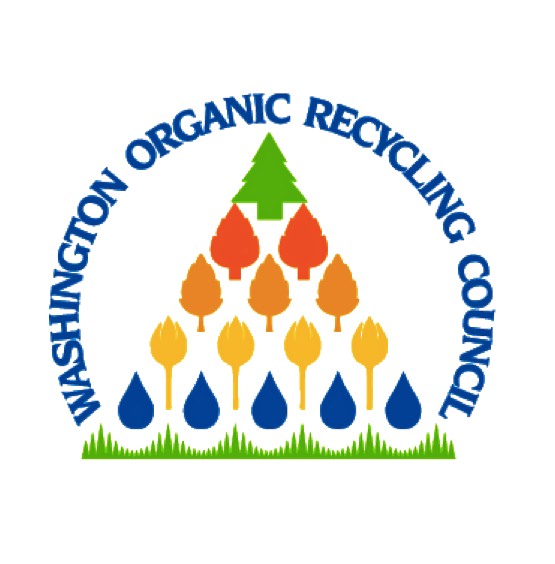Washington Organic Recycling Council
5727 Baker Way NW
Suite 200
Gig Harbor, WA 98332
1-877-460-5880
WORC@AMINC.org
Mission
The Washington Organic Recycling Council supports—via education, research, and advocacy—public and private efforts to reclaim, reuse, and recycle organic materials, process organic materials in an environmentally and economically sustainable manner, and promote beneficial end uses.
Vision
As leaders in the field of organics reclamation and transformation, WORC and its members are instrumental in creating a sustainable future for Washington.
About WORC
WORC is a nonprofit organization formed in response to demands for increased recycling of organic materials. We are a very diverse group that includes organic waste processors, government officials, vendors, consultants, educators, students, researchers, and private citizens. One thing we all have is common: We all firmly believe in and work to support the organic recycling industry in Washington State. WORC provides a unified statewide voice on many issues: research, education (through Operator Training, conference, and other programs), product safety and standards, government regulations, environmental planning, trade, marketing, and public education and involvement.
Since 1991, WORC has been recognized as the statewide organization representing organic recyclers, and facilitates communication between the private and public sectors. The Council works closely with state and regional organizations, such as the Washington State Recycling Association and the Northwest Biosolids Management Association, to promote and encourage recycling of organic materials. WORC’s Soils for Salmon initiative is changing building practices to protect and restore soil. Nationally, WORC coordinates with other state composting organizations and the US Composting Council.
WORC is organized under IRS code as a nonprofit 501(c)6 trade organization. WORC is a membership organization governed by a member elected 18-person Board of Directors. Current issues and events are addressed by both standing and ad hoc committees. We encourage WORC members to participate on committees and guide our direction with your input. Support for our activities comes from membership dues revenue and sponsorship of WORC programs. Contact us to get involved, and please join WORC!
Why is Organic Recycling so Important?
Organic materials comprise over half of the solid waste generated in Washington, including yard debris, wood materials, biosolids, food and food processing by-products, manure and agricultural residues, land clearing debris, used paper, and mixed municipal organic waste.
In the past, organic materials have been dumped in landfills or burned. These disposal methods can waste valuable resources and contribute to important environmental problems. Our members' contributions assist communities in reaching their recycling goals while producing valuable recycled products.
Everyone benefits when organic materials are recycled into products of value. They have a positive impact on our environment by improving soil and plant health, conserving water, reducing and cleaning stormwater runoff, reducing erosion, and reducing the use of fertilizers and pesticides. They also replace other natural resources for paper, products, and fuel production.
Returning to the Soil, Harvests from the Earth
There are many beneficial products and uses for organic materials. Closing the loop by composting, digesting, or mulching organics is an essential use, to restore and maintain Washington’s soils – the foundation of our success.
We are excited about the many possibilities in organics recovery and processing, and hope you'll join us in promoting organic recycling as an important component of sustainable community development.
What are WORC's priorities?
Support organic recycling, create jobs, and provide long-term environmentally safe alternatives to conventional or outmoded waste-handling practices, such as land filling and outdoor burning.
Promote composting, anaerobic digestion, wood recycling, and other methods of producing value-added recycled products.
Promote the environmental benefits of organic materials, especially protecting our climate and building healthy soil to manage stormwater runoff, conserve water, and grow sustainable landscapes and agriculture.
Support market development to increase sales of compost, digested manure, mulch, wood, and other organic products.
Foster cooperation among public and private organizations involved in organic recycling, and work for sound and reasonable standards and regulations. WORC provides an active network for all people interested in the organic recycling industry to increase awareness about important issues and events.
Support technical training, scientific research, collection and processing innovation, and new product development.
Encourage education and involvement of Council members and the public about organic recycling. Successfully advocate at the state-wide level for organics recovery and use including the inclusion and specification of compost and other organic products in state programs.
What has WORC accomplished?
Our members' contributions have helped assist communities in reaching their recycling goals while producing valuable recycled products. Since its inception, WORC has accomplished and continues to accomplish a number of goals, which include:
WORC continually participates in the development and review of organics-related regulations and guidelines written by the Departments of Ecology, Agriculture, and the legislature – we successfully advocate for creating practical, cost effective, and sustainable regulations.
WORC leaps into the fray and takes the lead when challenges arise, such as contamination and odor issues, where WORC worked with regulators and stakeholders to resolve the problems through a “best available science” and best practices approach.
WORC develops technical expertise and training programs for composters, regulators, and other stakeholders, such as the Compost Facility Operator Training Program, Regulator Training, conferences and workshops.
WORC collaborates on national standards and specifications with the US Composting Council, LEED and Sustainable Sites building project certifications, US EPA, and state and local governments and DOT’s.
WORC develops and promotes programs that educate about the benefits of compost, and support the marketing of recovered organic materials. The Soils for Salmon Project has been recognized both regionally and nationally as an award winning program.
These goals can’t be carried out without the cooperation of all parties interested in the organic recycling industry. Your participation in WORC will help strengthen the voice of Washington's organic recycling industry.
For more information on membership and member services, see join WORC or contact us.
